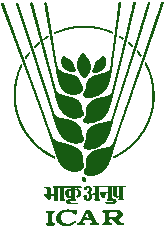
About Us
ICAR Research Complex for NEH Region, Nagaland Centre is situated adjacent to NH-39 along the Dimapur - Kohima route, which is about 25km far from Dimapur having a latitude of 25o45'24"N, longtitude of 93o50'26"E, and altitude of 295m AMSL. The State falls under monsoon zone. The annual rainfall varies from 2000 to 2500 mm. However, the state receives considerable amount of rainfall during pre-monsoon (March-May) and post monsoon (October-November) periods, with an annual humidity of 70 to 80% and average temperature range of 10oC to 25oC. The average bright sunshine hours received in the state is 2-5 hours during monsoon and 7-8 hours during winter. The topography is mostly hilly and has three distinct agro-

climate zones. The agro-climatic conditions of the State are excellent for growing all types of fruits, vegetables, flowers, spices and condiments, aromatic and medicinal plants, plantation crops, etc., ranging from temperate to tropical crops under rain fed conditions.
The infrastructure facility of the centre includes an Administration Building, a Central Laboratory, an Experimental Farm, a Livestock Farm (Poultry, Pig, Duck, Rabbit, Cattle), a Scientists' Home and a Farmers'Hostel. Five Krishi Vigyan Kendras (KVKs), namely, KVK Dimapur, KVK Wokha, KVK Longleng, KVK Peren and KVK Kiphire are under the administrative control of this Centre. The centre is functioning at Jharnapani since 1975 with the following objectives.
• To evolve sustainable integrated farming system for hills to replace Jhum cultivation.
• Restoration of degrade/ Jhum fallow lands through tree based farming.
• To increase the overall productivity of different crops through research in cereals,
pulses, oilseeds, horticultural, fisheries and other economical crops.
• Animal health coverage and improvement of livestock production system.
• To act as repository of agricultural information on net work for state regional
international market.
Mandate of the Institute
• Development of sustainable farming systems for different agro-climatic and socio-economic zones of the
region. Improvement in rain-fed agriculture through watershed based approach.
• Improvement in the productivity of different crops, live stocks and aquatic fauna through the development
/ screening of varieties and agro-techniques.
• Development of local competence through training on agriculture and allied sectors.
• Development of effective linkages with other development departments, financing agencies and SAUs /
CAUs operating in the region.
• To maintain database and act as a repository of information centre on agriculture and allied sectors and
to provide consultancy in the above areas including plant and animal bio-technology.
• Germplasm exchange, research update in a collaborative mode with other national and international
agencies.
Research Agenda
• Farming systems research and agro-forestry interventions through water shed based approach and
development of efficient cropping systems.
• Development and screening of suitable crop varieties and animal breeds.
• Soil and nutrient management and soil and water conservation.
• Development of technologies for organic food production.
• Diseases and pest management.
• Improvement of fruits, vegetables and spices including floriculture and hi-tech horticulture.
• Farm mechanization.
• Post harvest technology.
• Rodent management.
• Development of animal health covers measures.
• Development of aquaculture in hills.
• Molecular genetic studies in IPR perspective.
• Testing and refinement of evolved technologies at farmers’ field and their dissemination.
• Use of Information Technology in Agriculture and also market.
The infrastructure facility of the centre includes an Administration Building, a Central Laboratory, an Experimental Farm, a Livestock Farm (Poultry, Pig, Duck, Rabbit, Cattle), a Scientists' Home and a Farmers'Hostel. Five Krishi Vigyan Kendras (KVKs), namely, KVK Dimapur, KVK Wokha, KVK Longleng, KVK Peren and KVK Kiphire are under the administrative control of this Centre. The centre is functioning at Jharnapani since 1975 with the following objectives.
• To evolve sustainable integrated farming system for hills to replace Jhum cultivation.
• Restoration of degrade/ Jhum fallow lands through tree based farming.
• To increase the overall productivity of different crops through research in cereals,
pulses, oilseeds, horticultural, fisheries and other economical crops.
• Animal health coverage and improvement of livestock production system.
• To act as repository of agricultural information on net work for state regional
international market.
Mandate of the Institute
• Development of sustainable farming systems for different agro-climatic and socio-economic zones of the
region. Improvement in rain-fed agriculture through watershed based approach.
• Improvement in the productivity of different crops, live stocks and aquatic fauna through the development
/ screening of varieties and agro-techniques.
• Development of local competence through training on agriculture and allied sectors.
• Development of effective linkages with other development departments, financing agencies and SAUs /
CAUs operating in the region.
• To maintain database and act as a repository of information centre on agriculture and allied sectors and
to provide consultancy in the above areas including plant and animal bio-technology.
• Germplasm exchange, research update in a collaborative mode with other national and international
agencies.
Research Agenda
• Farming systems research and agro-forestry interventions through water shed based approach and
development of efficient cropping systems.
• Development and screening of suitable crop varieties and animal breeds.
• Soil and nutrient management and soil and water conservation.
• Development of technologies for organic food production.
• Diseases and pest management.
• Improvement of fruits, vegetables and spices including floriculture and hi-tech horticulture.
• Farm mechanization.
• Post harvest technology.
• Rodent management.
• Development of animal health covers measures.
• Development of aquaculture in hills.
• Molecular genetic studies in IPR perspective.
• Testing and refinement of evolved technologies at farmers’ field and their dissemination.
• Use of Information Technology in Agriculture and also market.



